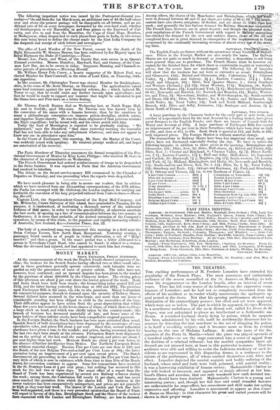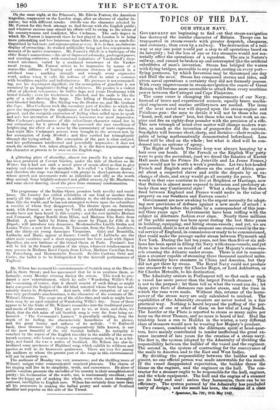THE THEATRES.
THE exciting performances of M. Frederic Lemaitre have extended the popularity of the French Plays. The most numerous and enthusiastic audience of the season assembled at the St. James's on Monday, to wel- come his reappearance on the London boards, after an interval of seven years. Time has left some traces of its influence on the expressive coun- tenance of Lemaitre; and he had not so completely recovered from the effects of his accident as to render wholly unnecessary the apologetic ap- peal posted at the doors. Not that his opening performance showed any diminution of his extraordinary powers: but effort and art were apparent, which were not so before. The part in which he appeared, Georges Maurice, in a murderous melodrama of the mcst dismal sort, called La Dome de St. Tropez, was not calculated to please an intellectual or a fashionable au- dience. A wretched husband slowly dying by poison, which he suspects has been administered by his wife, until he accidentally discovers her in- nocence by detecting the real murderer in the act of drugging his potion, is in itself a revolting subject; and it becomes more so from its evident bearing on the oase of Madame Laffarge. It suits the taste of the fre- quenters of the Porte St. Martin—where the piece was played upwards of a hundred nights—to see the stage converted into a court of appeal from the decision of a criminal tribunal: but the morbid sympathies there ad- dressed are not aroused here, at least in this particular instance. That the audience were able and willing to resist the ludicrous tendency of such in- cidents as are represented in this disgusting drama, is a testimony to the talents of the performers; all of whom exerted themselves with force and effect. Lemaitre depicted the mental anguish and bodily suffering of the husband, whose mind and body were both poisoned, with painful reality it was a harrowing exhibition of human misery. Mademoiselle Clarissa as the wife looked so innocent, and appeared so deeply affected at her hus- band's illness- and aversion, that one only wondered how such devoted ten- derness should have been doubted. Mademoiselle Clarisee is a young and interesting person; and, though her full face and small rounded features are unfavourable for stage-effect, her earnestness and skill make her acting expressive and affecting. Lemaitre is announced to appear as Don Cellar de Baron on Monday: in that character his great and varied powers will be shown in their proper range. On the same night, at the Princess's, Mr. Edwin Forrest, the American tragedian, reappeared on the London stage, after an absence of similar du- ration; but with different results. Othello was the character selected by Mr. Forrest for this fresh attempt to find favour with the English public; and whatever success may attend his efforts will be owing to the talent of his countrywoman and coadjutor, Miss Cushman. The only degree in which Mr. Forrest is improved since he last played in London is in being more painstaking and less boisterous than before: his acting is as much dis- tinguished by bad taste and misconception as ever. It is, in fact, an elaborate display of overacting; its studied artificiality being not less conspicuous on account of its native coarseness. Mr. Forrest's Othello is a burlesque of the elder Kean's mannerisms,—his air of depressed solemnity, prolonged pauses, and startling outbursts; with occasional imitations of Vandenhoff's deep- voiced utterance, varied by a continual recurrence of the Yankee nasal twang. Mr. Forrest strives to be impressive by means of a statue-like stillness of bearing and extreme slowness of speech in a subdued tone : marking strongly and wrongly every expressive word, unless when it suits his notions of effect to utter a sentence with breathless rapidity and indistinctness. His presence is not command- ing, nor his deportment dignified; for the assumption of grandeur is not sustained by an imaginative feeling of nobleness. His passion is a violent effort of physical vehemence: he bullies lago, and treats Desdemona with brutal ferocity: even his tenderness is affected, and his smile is like the grin of a wolf showing his fangs. The killing of Desdemona was a cool-blooded butchery. Mrs. Stirling was the Desdemna, and Mr. Graham the logo. Miss Cushman took the secondary part of Emilia; to which she gave due importance by the significance of her looks when in the back- ground, and the energetic expression of feeling when called upon to speak and act: her attestation of Desdemona's innocence was most impressive. Miss Cushman's performance of this subordinate character raised her in our estimation; for it proved that she possessed the rare excellence of heightening the effect of a scene by the commentary of mute expression. Last night Miss Cushman's powers were brought to the severest test, by her assumption of Lady Macbeth ; and they carried her triumphantly through the trying ordeal. Her conception of the part is clear and just, and her performance intellectual and powerfully impressive: it does not reach the sublime, but, taken altogether, it is the finest impersonation of the character at present to be seen on the English stage.



























 Previous page
Previous page